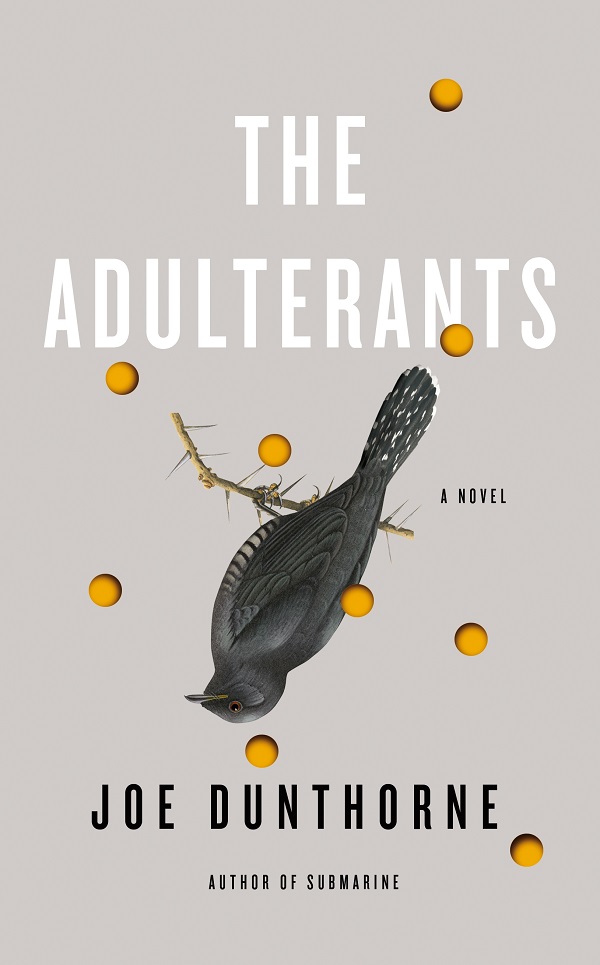Joe Dunthorne: The Adulterants review - a richly illuminating comedy of disappointment | reviews, news & interviews
Joe Dunthorne: The Adulterants review - a richly illuminating comedy of disappointment
Joe Dunthorne: The Adulterants review - a richly illuminating comedy of disappointment
Thirtysomething aspirations are deftly skewered in an update on Waugh and Amis

Joe Dunthorne's debut novel Submarine (2008) burrowed plausibly inside the head of a teenager worrying about sex and his parents’ marriage. Richard Ayaode latched onto its quizzical appeal in his film adaptation. Dunthorne’s longer and more ambitious second novel Wild Abandon (2011) set up camp in a hippy commune in which social conventions were quirkily upended.
The first two novels were set in or around Swansea, where Dunthorne grew up. The Adulterants relocates to a patch of north-east London where a coterie of thirtysomethings are trying to see their way onto the property ladder. “We were not the kind of friendship group who valued muscles,” confides Ray, Dunthorne's narrator. They’re all from out of town but have osmotically adopted London foibles such as kissing both cheeks: “if, at first, there’d been a little sarcasm in it – we were making fun of theatre people – that was gone now and we were just those people”.
 It’s 2011, when the capital plays host to an outbreak of riots and looting. Ray will inadvertently be sucked into that narrative, but first he must prove himself unreliable in other ways. He is that very contemporary flop, a freelance tech journo generating pointless copy from home for a poor return. He remembers having once enjoyed this demeaning labour as something he could fondly reminisce about in future inteviews reflecting on his brilliant success: projection and retrospection in one delusional package. Ray is strung between two worlds sartorially too: he dresses in a brand which gestures at adulthood but enables him to “not lose contact with the atmosphere of skateboarding”. His emotional barometer is stuck on cynicism, which rates and devalues every experience, even when it’s watching a child prodigy play the violin: “It’s easy to get a standing ovation when the seats are so uncomfortable,” he says churlishly.
It’s 2011, when the capital plays host to an outbreak of riots and looting. Ray will inadvertently be sucked into that narrative, but first he must prove himself unreliable in other ways. He is that very contemporary flop, a freelance tech journo generating pointless copy from home for a poor return. He remembers having once enjoyed this demeaning labour as something he could fondly reminisce about in future inteviews reflecting on his brilliant success: projection and retrospection in one delusional package. Ray is strung between two worlds sartorially too: he dresses in a brand which gestures at adulthood but enables him to “not lose contact with the atmosphere of skateboarding”. His emotional barometer is stuck on cynicism, which rates and devalues every experience, even when it’s watching a child prodigy play the violin: “It’s easy to get a standing ovation when the seats are so uncomfortable,” he says churlishly.
The science of ubiquitous marketing skews Ray’s perceptions. He cites a scientific study “that proves holding hot drinks makes people appear warmer, kinder, more trustworthy”. He spots someone with a phone in a rubber casing designed “for people who lead extreme lives”. His friend Marie, he notes (with expert punctuation and exquisite bathos), has a job in research which “involved having deep, personal conversations with ordinary people about, for example, life, death, love and fate, as a way to better understand, for example, dishwasher tablets”.
We first encounter Ray at a party where Marie, who is crushingly beautiful, lures him into non-sexual encounter on the cusp of ethical dubiety. “We didn’t take off our shoes which made a difference, morally,” reasons Ray. Marie’s boyfriend Lee, who happily plays away all the time, nonetheless punches his face in. Lee - who wears “the uniform of handsome people. Fresh white T-shirts and blue jeans” – is thrown out by Marie and fetches up squatting with Ray and his wife, a night nurse in ICU called Garthene, whose name Ray has much fun inspecting from different angles. Ray loves everything about Garthene, even the shape of her head which, “at a guess, had the dimensions of a child’s shoebox”. The rest of her is changing shape before his eyes: she is pregnant. Seemingly the more grounded adult in the marriage, it’ll be her salary that gets them the mortgage enabling them to buy a flat in a dismal pocket of north-east London. The over-friendly estate agent Dan “was the one person on this earth to whom we wished to appear boring and normal”.
Ray yearns for the wealth effortlessly accrued by his parents, arty retirees who rattle around in a converted windmill in Norfolk. He drools at Georgian terraces with single doorbells: “I fundamentally hated these people while simultaneously wanting to be them.” Conflicted about his grown-up desires, he sees disinterring original floorboards as “bourgeois archaeology”. He and Garthene are working to become the kind of people who want to visit a wetland centre.
It’s Ray’s social envy, targeted principally at the cash buyers also bidding for their dream home as (wait for it) a buy-to-let, that gets him into trouble. Hilariously he then imagines he can sweet-talk his way through the legal system. The riots aren't all bad. It's during the civil disobedience that he reports on frank, funny and lovely sex with Garthene. But even here there is disquiet: Ray’s other problem is jealousy. The man he imagines to be his rival is very tall, “right on the boundary between commanding and absurd”.
For all Ray’s detached appraisal of his environment, he can't stay on the fringes looking in forever. The Adulterants intensifies emotionally so that it can suddenly floor you with a brushstroke. When Garthene’s womb is scanned at the hospital they discover the gender. “And like that, a whole timeline fell away. All our intelligent, beautiful daughters, their sarcasm at breakfast, were gone.”
Ray is a failing heterosexual misfit – briefly he also fails as a homosexual - who speaks for that first generation destined to be less well-off than their parents. His keenly attuned perception is alive to every indignity, to the distance between hope and reality, as precisely measured as that between London's smart parts and shit bits. His problem - and the source of so much treasure in Dunthorne’s voice - is that he sees and interprets everything, often by the pinpointed glare of screens: he watches a mobile up-light Garthene’s bump; Dan the estate agent’s sunburn is “picked up by the screen’s fluorescence”; at one point light is cast by “the twitching of the Wi-Fi router”.
These technological witnesses are the tools which have made everything faster and better while not enriching a conflicted narrator who, like others of his age, has both more and less. The Adulterants is a richly illuminating comedy of disappointment, uproarious and mournful, that places Joe Dunthorne triumphantly in the tradition of Evelyn Waugh and (that other Swansea resident) Kingsley Amis. A deft, brilliant, surprising joyride.
The future of Arts Journalism
You can stop theartsdesk.com closing!
We urgently need financing to survive. Our fundraising drive has thus far raised £33,000 but we need to reach £100,000 or we will be forced to close. Please contribute here: https://gofund.me/c3f6033d
And if you can forward this information to anyone who might assist, we’d be grateful.

Subscribe to theartsdesk.com
Thank you for continuing to read our work on theartsdesk.com. For unlimited access to every article in its entirety, including our archive of more than 15,000 pieces, we're asking for £5 per month or £40 per year. We feel it's a very good deal, and hope you do too.
To take a subscription now simply click here.
And if you're looking for that extra gift for a friend or family member, why not treat them to a theartsdesk.com gift subscription?
more Books
 Help to give theartsdesk a future!
Support our GoFundMe appeal
Help to give theartsdesk a future!
Support our GoFundMe appeal
 William J. Mann: Bogie & Bacall review - beyond the screen
Why we're still in love with Bogart and Bacall, and their legendary Hollywood romance
William J. Mann: Bogie & Bacall review - beyond the screen
Why we're still in love with Bogart and Bacall, and their legendary Hollywood romance
 Jeff Young: Wild Twin review - a box of tricks
Fragments cohere in this dog-eared history of an itinerant life
Jeff Young: Wild Twin review - a box of tricks
Fragments cohere in this dog-eared history of an itinerant life
 Interview: rising star Chloe Savage on the Arctic, outer space, and igniting children's wonder for the unknown
Beautiful books take you to worlds that are intricately imagined and a feast for the eye
Interview: rising star Chloe Savage on the Arctic, outer space, and igniting children's wonder for the unknown
Beautiful books take you to worlds that are intricately imagined and a feast for the eye
 Jon Fosse: Morning and Evening review - after thoughts
Damion Searls thoughtfully translates the wise words of 2023’s Nobel Prize winner
Jon Fosse: Morning and Evening review - after thoughts
Damion Searls thoughtfully translates the wise words of 2023’s Nobel Prize winner
 Jean-Baptiste Fressoz: More and More and More review - fuel for thought
A re-reading of our complex history of energy use shows the long way we have to go
Jean-Baptiste Fressoz: More and More and More review - fuel for thought
A re-reading of our complex history of energy use shows the long way we have to go
 Alan Hollinghurst: Our Evenings review - a gift that keeps on giving
Common themes are retuned with political edge in critique of Brexit, race, and sexuality
Alan Hollinghurst: Our Evenings review - a gift that keeps on giving
Common themes are retuned with political edge in critique of Brexit, race, and sexuality
 Jonathan Coe: The Proof of My Innocence review - a whodunnit with a difference
Political satire, social observation and literary artifice elevate this ostensibly 'cosy crime' caper
Jonathan Coe: The Proof of My Innocence review - a whodunnit with a difference
Political satire, social observation and literary artifice elevate this ostensibly 'cosy crime' caper
 theartsdesk Q&A: Anna Bogutskaya on her new book about the past decade of horror cinema
In time for Halloween, the author discusses 'Feeding the Monster' - and why she thinks horror cinema has entered a new phase
theartsdesk Q&A: Anna Bogutskaya on her new book about the past decade of horror cinema
In time for Halloween, the author discusses 'Feeding the Monster' - and why she thinks horror cinema has entered a new phase
 Olga Tokarczuk: The Empusium review - paranoid prose
Antonia Lloyd-Jones translates a contagious work from a Nobel Prize winner
Olga Tokarczuk: The Empusium review - paranoid prose
Antonia Lloyd-Jones translates a contagious work from a Nobel Prize winner
 Stevie Smith: Not Waving But Drowning review - riding the wave
This slim and stylish new edition can't quite dispel some lurking doubts
Stevie Smith: Not Waving But Drowning review - riding the wave
This slim and stylish new edition can't quite dispel some lurking doubts
 Ellen McWilliams: Resting Places - On Wounds, War and the Irish Revolution review - finding art in the inarticulable
A violent history finds a home in this impressionistic blend of literary criticism and memoir
Ellen McWilliams: Resting Places - On Wounds, War and the Irish Revolution review - finding art in the inarticulable
A violent history finds a home in this impressionistic blend of literary criticism and memoir

Add comment